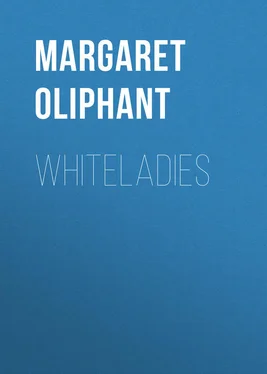Margaret Oliphant - Whiteladies
Здесь есть возможность читать онлайн «Margaret Oliphant - Whiteladies» — ознакомительный отрывок электронной книги совершенно бесплатно, а после прочтения отрывка купить полную версию. В некоторых случаях можно слушать аудио, скачать через торрент в формате fb2 и присутствует краткое содержание. ISBN: , Жанр: foreign_prose, на английском языке. Описание произведения, (предисловие) а так же отзывы посетителей доступны на портале библиотеки ЛибКат.
- Название:Whiteladies
- Автор:
- Жанр:
- Год:неизвестен
- ISBN:http://www.gutenberg.org/ebooks/52388
- Рейтинг книги:5 / 5. Голосов: 1
-
Избранное:Добавить в избранное
- Отзывы:
-
Ваша оценка:
- 100
- 1
- 2
- 3
- 4
- 5
Whiteladies: краткое содержание, описание и аннотация
Предлагаем к чтению аннотацию, описание, краткое содержание или предисловие (зависит от того, что написал сам автор книги «Whiteladies»). Если вы не нашли необходимую информацию о книге — напишите в комментариях, мы постараемся отыскать её.
Whiteladies — читать онлайн ознакомительный отрывок
Ниже представлен текст книги, разбитый по страницам. Система сохранения места последней прочитанной страницы, позволяет с удобством читать онлайн бесплатно книгу «Whiteladies», без необходимости каждый раз заново искать на чём Вы остановились. Поставьте закладку, и сможете в любой момент перейти на страницу, на которой закончили чтение.
Интервал:
Закладка:
Thus the day went on. In the afternoon she had one visitor, and only one, the vicar, Mr. Gerard, who came by the north gate, as her visitors yesterday had done, and crossed the lawn to the porch with much less satisfaction of mind than Miss Susan had to see him coming.
“Of course you know what has brought me,” he said at once, seating himself in a garden-chair which had been standing outside on the lawn, and which he brought in after his first greeting. “This chantry of your sister’s is a thing I don’t understand, and I don’t know how I can consent to it. It is alien to all the customs of the time. It is a thing that ought to have been built three hundred years ago, if at all. It will be a bit of bran new Gothic, a thing I detest; and in short I don’t understand it, nor what possible meaning a chantry can have in these days.”
“Neither do I,” said Miss Susan smiling, “not the least in the world.”
“If it is meant for masses for the dead,” said Mr. Gerard – “some people I know have gone as far as that – but I could not consent to it, Miss Austin. It should have been built three hundred years ago, if at all.”
“Augustine could not have built it three hundred years ago,” said Miss Susan, “for the best of reasons. My own opinion is, between ourselves, that had she been born three hundred years ago she would have been a happier woman; but neither she nor I can change that.”
“That is not the question,” said the vicar. He was a man with a fine faculty for being annoyed. There was a longitudinal line in his forehead between his eyes, which was continually moving, marking the passing irritations which went and came, and his voice had a querulous tone. He was in the way of thinking that everything that happened out of the natural course was done to annoy him specially, and he felt it a personal grievance that the Austin chantry had not been built in the sixteenth century. “There might have been some sense in it then,” he added, “and though art was low about that time, still it would have got toned down, and been probably an ornament to the church; but a white, staring, new thing with spick and span pinnacles! I do not see how I can consent.”
“At all events,” said Miss Susan, showing the faintest edge of claw under the velvet of her touch, “no one can blame you at least, which I think is always a consolation. I have just been going over the accounts for the restoration of the chancel, and I think you may congratulate yourself that you have not got to pay them. Austine would kill me if she heard me, but that is one good of a lay rector. I hope you won’t oppose her, seriously, Mr. Gerard. It is not masses for the dead she is thinking of. You know her crotchets. My sister has a very fine mind when she is roused to exert it,” Miss Susan said with a little dignity, “but it is nonsense to deny that she has crotchets, and I hope you are too wise and kind to oppose her. The endowment will be good, and the chantry pretty. Why, it is by Sir Gilbert Scott.”
“No, no, not Sir Gilbert himself; at least, I fear not,” said Mr. Gerard, melting.
“One of his favorite pupils, and he has looked at it and approved. We shall have people coming to see it from all parts of the country; and it is Augustine’s favorite crotchet. I am sure, Mr. Gerard, you will not seriously oppose.”
Thus it was that the vicar was taken over. He reflected afterward that there was consolation in the view of the subject which she introduced so cunningly, and that he could no more be found fault with for the new chantry which the lay rector had a right to connect with his part of the church if he chose – than he could be made to pay the bills for the restoration of the chancel. And Miss Susan had put it to him so delicately about her sister’s crotchets that what could a gentleman do but yield? The longitudinal line on his forehead smoothed out accordingly, and his tone ceased to be querulous. Yes, there was no doubt she had crotchets, poor soul; indeed, she was half crazy, perhaps, as the village people thought, but a good religious creature, fond of prayers and church services, and not clever enough to go far astray in point of doctrine. As Mr. Gerard went home, indeed, having committed himself, he discovered a number of admirable reasons for tolerating Augustine and her crotchets. If she sank money enough to secure an endowment of sixty pounds a year, in order to have prayers said daily in her chantry, as she called it, it was clear that thirty or forty from Mr. Gerard instead of the eighty he now paid, would be quite enough for his curate’s salary. For what could a curate want with more than, or even so much as, a hundred pounds a year? And then the almshouses disposed of the old people of the parish in the most comfortable way, and on the whole, Augustine did more good than harm. Poor thing! It would be a pity, he thought, to cross this innocent and pious creature, who was “deficient,” but too gentle and good to be interfered with in her crotchets. Poor Augustine, whom they all disposed of so calmly! Perhaps it was foolish enough of her to stay alone in the little almshouse chapel all the time that this interview was going on, praying that God would touch the heart of His servant and render it favorable toward her, while Miss Susan managed it all so deftly by mere sleight of hand; but on the whole, Augustine’s idea of the world as a place where God did move hearts for small matters as well as great, was a more elevated one than the others. She felt quite sure when she glided through the Summer fields, still and gray in her strange dress, that God’s servants’ hearts had been moved to favor her, and that she might begin her work at once.
CHAPTER VII
SUSAN AUSTIN said no more about her intended expedition, except to Martha, who had orders to prepare for the journey, and who was thrown into an excitement somewhat unbecoming her years by the fact that her mistress preferred to take Jane as her attendant, which was a slight very trying to the elder woman. “I cannot indulge myself by taking you,” said Miss Susan, “because I want you to take care of my sister; she requires more attendance than I do, Martha, and you will watch over her.” I am afraid that Miss Susan had a double motive in this decision, as most people have, and preferred Jane, who was young and strong, to the other, who required her little comforts, and did not like to be hurried, or put out; but she veiled the personal preference under a good substantial reason which is a very good thing to do in all cases, where it is desirable that the wheels of life should go easily. Martha had “a good cry,” but then consoled herself with the importance of her charge. “Not as it wants much cleverness to dress Miss Augustine, as never puts on nothing worth looking at – that gray thing for ever and ever!” she said, with natural contempt. Augustine herself was wholly occupied with the chantry, and took no interest in her sister’s movements; and there was no one else to inquire into them or ask a reason. She went off accordingly quite quietly and unobserved, with one box, and Jane in delighted attendance. Miss Susan took her best black silk with her, which she wore seldom, having fallen into the custom of the gray gown to please Augustine, a motive which in small matters was her chief rule of action; – on this occasion, however, she intended to be as magnificent as the best contents of her wardrobe could make her, taking, also, her Indian shawl and newest bonnet. These signs of superiority would not, she felt sure, be thrown away on a linen-draper. She took with her also, by way of appealing to another order of feelings, a very imposing picture of the house of Whiteladies, in which a gorgeous procession, escorting Queen Elizabeth, who was reported to have visited the place, was represented as issuing from the old porch. It seemed to Miss Susan that nobody who saw this picture could be willing to relinquish the house, for, indeed, her knowledge of it was limited. She set out one evening, resolved, with heroic courage, to commit herself to the Antwerp boat, which in Miss Susan’s early days had been the chief and natural mode of conveyance. Impossible to tell how tranquil the country was as she left it – the laborers going home, the balmy kine wandering devious and leisurely with melodious lowings through the quiet roads. Life would go on with all its quiet routine unbroken, while Miss Susan dared the dangers of the deep, and prayer bell and dinner bell ring just as usual, and Augustine and her almshouse people go through all their pious habitudes. She was away from home so seldom, that this universal sway of common life and custom struck her strangely, with a humiliating sense of her own unimportance – she who was so important, the centre of everything. Jane, her young maid, felt the same sentiment in a totally different way, being full of pride and exultation in her own unusualness, and delicious contempt for those unfortunates to whom this day was just the same as any other.
Читать дальшеИнтервал:
Закладка:
Похожие книги на «Whiteladies»
Представляем Вашему вниманию похожие книги на «Whiteladies» списком для выбора. Мы отобрали схожую по названию и смыслу литературу в надежде предоставить читателям больше вариантов отыскать новые, интересные, ещё непрочитанные произведения.
Обсуждение, отзывы о книге «Whiteladies» и просто собственные мнения читателей. Оставьте ваши комментарии, напишите, что Вы думаете о произведении, его смысле или главных героях. Укажите что конкретно понравилось, а что нет, и почему Вы так считаете.












